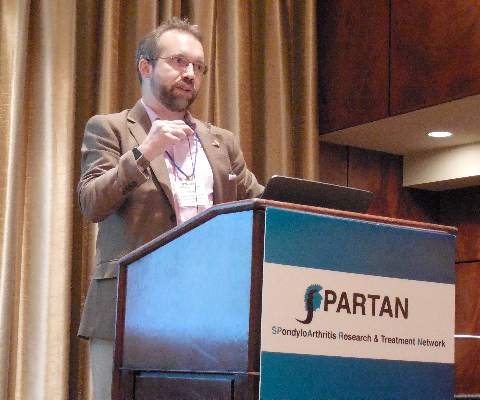User login
DENVER – During early 2015, exactly a quarter of all patients seen in U.S. rheumatology practices were diagnosed with rheumatoid arthritis, and among them two-thirds received treatment with a disease modifying nonbiologic drug, based on data from more than 200,000 patients who enrolled in an American College of Rheumatology registry during that time.
That’s an example of some of the data now available in an EHR-based registry run by the ACR and open to participation by any U.S.-based rheumatologist, Kaleb Michaud, PhD, said at the annual meeting of the Spondyloarthritis Research and Treatment Network.
The ACR’s Rheumatology Informatics System for Effectiveness (RISE) is an EHR-based registry of passive reporting that as of July 2016 had enrolled 614,738 U.S. patients treated by 1,284 providers in 213 practices, said Dr. Michaud, codirector of the National Data Bank for Rheumatic Diseases in Wichita, Kan., who works with the ACR on RISE as a volunteer.
Patient participation in RISE more than doubled during the past year, rising from 302,000 participating patients in September 2015. In addition to enrolling even more providers with more patients to participate, RISE’s organizers is also now seeking investigators who can use the data collected in RISE to address useful research questions, he said.
RISE has been designated a qualified clinical data registry (QCDR) by the Centers for Medicare & Medicaid Services. If providers using RISE sign an agreement stating that they want to participate for quality reporting purposes, it then happens automatically. Participating practices also meet Medicare’s meaningful use measure of reporting to a specialty registry. Although most rheumatologists with academic positions already have these opportunities, for community rheumatologists this access is “a perq,” Dr. Michaud said.
As just an example of the data trove accumulating in RISE, Dr, Michaud rattled off some quick figures culled from analysis of the 239,302 RISE patients in 55 U.S. practices who entered the registry during October 2014-September 2015. The patients averaged 59 years of age, three quarters were women, 61% were white, 48% had commercial insurance and 30% were covered through Medicare.
Their most recent diagnosis was rheumatoid arthritis in 25%, unspecified myalgia or myositis in 21%, Sjögren’s syndrome in 7%, systemic lupus erythematosus in 6%, psoriatic arthritis in 6%, spondyloarthritides in 4%, gout in 4%, and several other disorders at rates of 1% or less.
Among the rheumatoid arthritis patients, two-thirds were on a nonbiologic disease modifying drug, led by methotrexate in 65% of this subgroup and hydroxychloroquine in a third of the subgroup. A third of the entire study group was on treatment with a biologic or small-molecule drug. Etanercept (Enbrel) and adalimumab (Humira) led in this category with 8% of patients on each of these two drugs, followed by infliximab (Remicade) in 6%. Other usage rates in this category included abatacept (Orencia) in 4%, and tocilizumab (Actemra) and tofacitinib (Xeljanz) each used in about 2% of rheumatoid arthritis patients.
On Twitter @mitchelzoler
DENVER – During early 2015, exactly a quarter of all patients seen in U.S. rheumatology practices were diagnosed with rheumatoid arthritis, and among them two-thirds received treatment with a disease modifying nonbiologic drug, based on data from more than 200,000 patients who enrolled in an American College of Rheumatology registry during that time.
That’s an example of some of the data now available in an EHR-based registry run by the ACR and open to participation by any U.S.-based rheumatologist, Kaleb Michaud, PhD, said at the annual meeting of the Spondyloarthritis Research and Treatment Network.
The ACR’s Rheumatology Informatics System for Effectiveness (RISE) is an EHR-based registry of passive reporting that as of July 2016 had enrolled 614,738 U.S. patients treated by 1,284 providers in 213 practices, said Dr. Michaud, codirector of the National Data Bank for Rheumatic Diseases in Wichita, Kan., who works with the ACR on RISE as a volunteer.
Patient participation in RISE more than doubled during the past year, rising from 302,000 participating patients in September 2015. In addition to enrolling even more providers with more patients to participate, RISE’s organizers is also now seeking investigators who can use the data collected in RISE to address useful research questions, he said.
RISE has been designated a qualified clinical data registry (QCDR) by the Centers for Medicare & Medicaid Services. If providers using RISE sign an agreement stating that they want to participate for quality reporting purposes, it then happens automatically. Participating practices also meet Medicare’s meaningful use measure of reporting to a specialty registry. Although most rheumatologists with academic positions already have these opportunities, for community rheumatologists this access is “a perq,” Dr. Michaud said.
As just an example of the data trove accumulating in RISE, Dr, Michaud rattled off some quick figures culled from analysis of the 239,302 RISE patients in 55 U.S. practices who entered the registry during October 2014-September 2015. The patients averaged 59 years of age, three quarters were women, 61% were white, 48% had commercial insurance and 30% were covered through Medicare.
Their most recent diagnosis was rheumatoid arthritis in 25%, unspecified myalgia or myositis in 21%, Sjögren’s syndrome in 7%, systemic lupus erythematosus in 6%, psoriatic arthritis in 6%, spondyloarthritides in 4%, gout in 4%, and several other disorders at rates of 1% or less.
Among the rheumatoid arthritis patients, two-thirds were on a nonbiologic disease modifying drug, led by methotrexate in 65% of this subgroup and hydroxychloroquine in a third of the subgroup. A third of the entire study group was on treatment with a biologic or small-molecule drug. Etanercept (Enbrel) and adalimumab (Humira) led in this category with 8% of patients on each of these two drugs, followed by infliximab (Remicade) in 6%. Other usage rates in this category included abatacept (Orencia) in 4%, and tocilizumab (Actemra) and tofacitinib (Xeljanz) each used in about 2% of rheumatoid arthritis patients.
On Twitter @mitchelzoler
DENVER – During early 2015, exactly a quarter of all patients seen in U.S. rheumatology practices were diagnosed with rheumatoid arthritis, and among them two-thirds received treatment with a disease modifying nonbiologic drug, based on data from more than 200,000 patients who enrolled in an American College of Rheumatology registry during that time.
That’s an example of some of the data now available in an EHR-based registry run by the ACR and open to participation by any U.S.-based rheumatologist, Kaleb Michaud, PhD, said at the annual meeting of the Spondyloarthritis Research and Treatment Network.
The ACR’s Rheumatology Informatics System for Effectiveness (RISE) is an EHR-based registry of passive reporting that as of July 2016 had enrolled 614,738 U.S. patients treated by 1,284 providers in 213 practices, said Dr. Michaud, codirector of the National Data Bank for Rheumatic Diseases in Wichita, Kan., who works with the ACR on RISE as a volunteer.
Patient participation in RISE more than doubled during the past year, rising from 302,000 participating patients in September 2015. In addition to enrolling even more providers with more patients to participate, RISE’s organizers is also now seeking investigators who can use the data collected in RISE to address useful research questions, he said.
RISE has been designated a qualified clinical data registry (QCDR) by the Centers for Medicare & Medicaid Services. If providers using RISE sign an agreement stating that they want to participate for quality reporting purposes, it then happens automatically. Participating practices also meet Medicare’s meaningful use measure of reporting to a specialty registry. Although most rheumatologists with academic positions already have these opportunities, for community rheumatologists this access is “a perq,” Dr. Michaud said.
As just an example of the data trove accumulating in RISE, Dr, Michaud rattled off some quick figures culled from analysis of the 239,302 RISE patients in 55 U.S. practices who entered the registry during October 2014-September 2015. The patients averaged 59 years of age, three quarters were women, 61% were white, 48% had commercial insurance and 30% were covered through Medicare.
Their most recent diagnosis was rheumatoid arthritis in 25%, unspecified myalgia or myositis in 21%, Sjögren’s syndrome in 7%, systemic lupus erythematosus in 6%, psoriatic arthritis in 6%, spondyloarthritides in 4%, gout in 4%, and several other disorders at rates of 1% or less.
Among the rheumatoid arthritis patients, two-thirds were on a nonbiologic disease modifying drug, led by methotrexate in 65% of this subgroup and hydroxychloroquine in a third of the subgroup. A third of the entire study group was on treatment with a biologic or small-molecule drug. Etanercept (Enbrel) and adalimumab (Humira) led in this category with 8% of patients on each of these two drugs, followed by infliximab (Remicade) in 6%. Other usage rates in this category included abatacept (Orencia) in 4%, and tocilizumab (Actemra) and tofacitinib (Xeljanz) each used in about 2% of rheumatoid arthritis patients.
On Twitter @mitchelzoler
EXPERT ANALYSIS FROM THE 2016 SPARTAN ANNUAL MEETING

